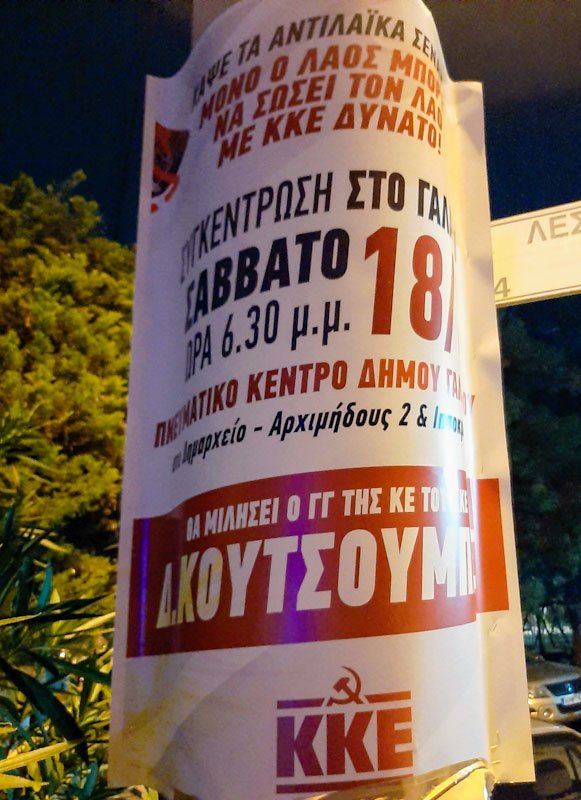Post-1990, old-left radical parties have become very rare in Europe. Politically relevant old-left radical parties are nearly extinct. So, as an occasional collector of odd political advertisements and even more occasional observer of Greek politics, I was quite happy to spot this gem in the wild.

The party in question is the KKE, the (original) Communist party of Greece. Founded in 1918, it played an important (and mostly tragic) role in modern Greek history. It is almost as old as the mountains, and it shows. But it still won 5.6 percent of the vote (15 seats) in 2019.
In a time when anti-elitist populism is allegedly all the rage, Leninists, which are by definition an avant-garde, face an interesting conundrum. The slogan at the top reads ‘only the people can save the people, with the power of the Communist party’. Old-school, eh?
When almost nobody else does, KKE still hold on to Marxism-Leninism, which could seem almost quaint. In fact, when the Soviet Union collapsed, they kicked out anyone who wasn’t a, er, traditionalist, so perhaps they are not quaint at all. Still, strictly observing the ideological tenets of the CPSU some three decades after the Muscovite Politburo ceased to exist should earn them a badge for political tenacity or something.
Given their resistance to acknowledge stuff that happened after the mid-1980s, it is not surprising that on the cultural dimension, their old-left radicalism has sometimes clashed with the radicalism of the New Left: in 2015, they voted against the introduction of civil partnerships for same sex couples, which got them a lot of flak from Syriza. Unlike Syriza, they also want to take Greece out of the EU and oppose any decriminalisation of personal drug use.
While the history and prehistory of Syriza is too complex for me to comprehend, I take it that some of the persons and organisations involved in it could be considered KKE dissidents / breakaways. This makes sense, I suppose.
What I had never suspected until an actual Greek person pointed it out to me a few hours ago is that even within Marxism-Leninism, there is still room for factionalism. Back in the 1960s, a Maoist group broke away from the main KKE over the question of revisionism. When Mao died in 1976, this is new group split again into two rival organisations (and some mere particles, I suppose). They are still around, and their current combined vote share is less than 0.2 percent. Their respective names are <drumroll> M-L KKE and KKE (m-l).

People of a certain age will inevitably have flashbacks of the PFJ/PJF acrimony in Life of Brian.
Stay tuned for more up-to-date, practical political information.
Discover more from kai arzheimer
Subscribe to get the latest posts sent to your email.

The tendency of Marxist splinter groups to take a far right culture war turn take a bit of getting used to
I wish I’d taken a photo of a poster I saw in Glasgow just after Russia’s full scale invasion of Ukraine in February 2022. It was for a Marxist public meeting entitled: “Ukraine and Taiwan: Outposts of Imperialism”. I know what they meant, but we can disagree on who the imperialists are